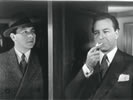Eye For Film >> Movies >> Hollow Triumph (1948) Film Review
Like many a film noir of its time, Hollow Triumph's plot is quite predictable, but the joy is in seeing how it all unfolds. Director Steve Sekely gets the style just right, and noir fans won’t be disappointed.
Paul Henreid (Casablanca, Now Voyager) plays the lead as arrogant John Muller, practised criminal and fraudster. Released from jail, where he has been serving time for selling non-existent oil shares, he is soon back with old pal Marcy (Herbert Rudley) and other associates planning a robbery. The others are reluctant, as this involves stealing from gambling boss Rocky Stansyck who is known for his persistence in hunting down those who cross him. When the job goes ahead, nothing goes quite as planned, and Johnny and Marcy are the only ones to escape.

Marcy is scared and runs off to Mexico, leaving Johnny to take a mundane office job as cover. In a visit from his brother he learns that he is still in danger, and his brother makes a fine little speech emphasising the obvious: “You never followed the rules. For you there were no rules. You were special... We know sooner or later it always catches up with us.” We certainly do. We expect nothing less.
In a chance encounter Johnny learns he has a double, one Dr Bartok - a psychoanalyst. But Bartok has a scar. From this point on we know that there will be duplicity, minor surgery, romance and an ironic twist of fate.
The romance comes in the form of Evelyn, Bartok’s secretary, very well played by Joan Bennett. Johnny has to charm her before pretending to leave her. There is the possibility that she is playing a wicked game - or she could turn out to be a decent human being? Apart from that, what can go wrong? Well, one thing goes very wrong and no one notices, the message being that we are all too egotistical to really take notice of other people. We see what we expect to see, and a confident character can easily allay suspicion.
Like most films noirs, this is very moralistic. The survivors are generally ordinary, decent people. Set yourself up too high and you will fall. So don’t think you’re someone special, don’t expect more than your fair share. (Don’t let’s ask for the stars…) There was also a fascination at the time with psychology. This film begins with a “mental report” on John, the prisoner. Among other things, he is said to have been practising psychoanalysis without a licence, something which must really have played on the fears of the time. The analyst’s job here is portrayed as a rather fine opportunity to stand around smoking while patients talk from the couch.
Smoking, that other essential of the genre, is used to good effect. Strangely, in an early scene Johnny refuses a cigarette saying: “You know I don’t smoke.” What? How is this going to work? But he proceeds to chain smoke his way through the rest of the film, even during surgery, when a slowly burning cigarette neatly shows the passage of time.
The film is well shot, with the low camera angles and shadows on the ceiling we have come to expect. There are one or two cliches, such as a speeding train, which is really quite irrelevant except to add excitement as a crime is committed. The background music is dramatic, though rather shakily edited, perhaps an element that could have done with more attention.
The final irony comes as no surprise and the film ends just as you expected. But this is not a bad thing. Indeed, it’s very satisfying.
Reviewed on: 18 May 2009



















